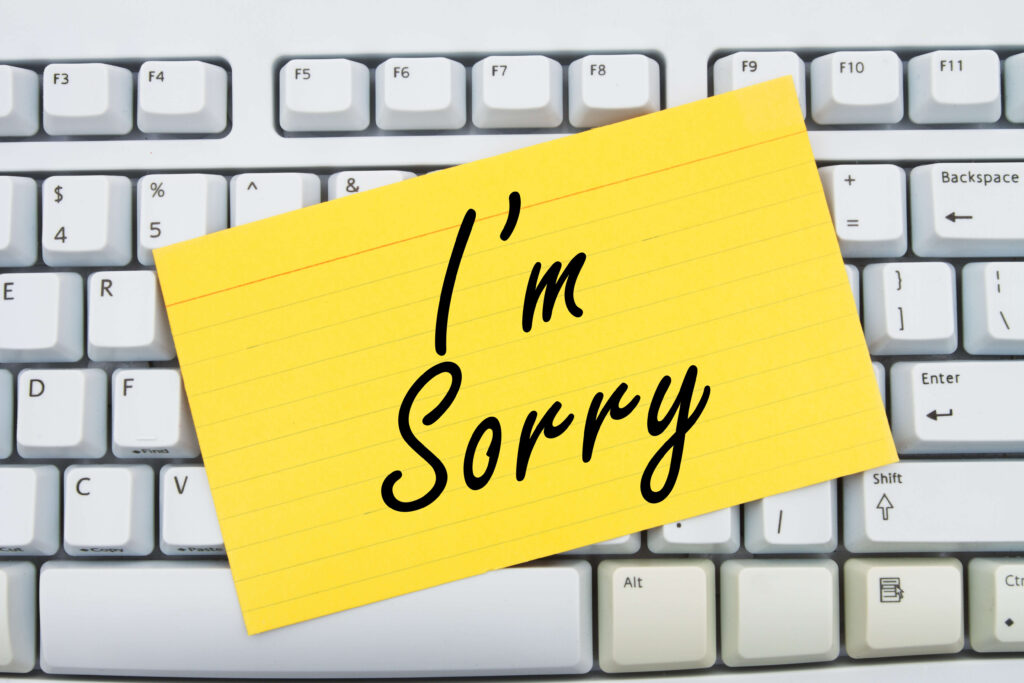“I’m sorry,” is one of the first things we’re taught to say when we’re children. However, something happens to many of us as we grow up that makes it harder and harder to offer an apology for our actions. Whether it’s an unwillingness to admit we’re wrong, or a dislike of taking responsibility, we instead try to push the blame onto something or someone else, including the person we’ve wronged. When we do, we’re not really apologizing and we often cause the conflict to escalate.
To ensure your apology is sincere and more likely to be accepted, be sure to follow these six tips for offering a sincere apology.
1. Before apologizing, be sure you’re actually sorry.
When you apologize when you don’t really mean it, you’re likely going to sound sarcastic, angry, or indifferent and your message will be lost on the other person. You might even re-ignite an argument. When delivering an apology, you need to sound sincerely remorseful for your actions. To do so, you must truly FEEL remorse for your actions. If you don’t, you need to re-evaluate whether you should apologize at this time. For example, if you’re still embarrassed about what you did and you’re feeling defensive, it’s probably best to wait a day or so for that feeling to subside before apologizing. However, don’t wait too long. An apology delayed is an apology denied.
2. Don’t just say, “I apologize,” or “I’m sorry.”
It’s important the other party know that YOU know exactly what you did wrong. Therefore an appropriate apology might be, “I’m sorry I didn’t give you the telephone message. I should have written it down and put it where you’d see it rather than thinking I would remember to tell you.”
3. Never include the word “but” in an apology.
When you say, “I’m sorry but …” you basically erase the apology and focus the attention on what you’ll say after, which is usually an excuse or an attempt to reverse blame.
“I’m sorry but, I didn’t have a pen to write down the message.”
“I’m sorry, but I don’t know why I have to take messages for you anyway, why don’t you just let your calls go to voicemail?”
No one wants to hear excuses rolled into an apology, nor do they want you to turn the discussion into an opportunity for you to blame them for your mistake.
4. Apologize face-to-face, or by phone.
An apology is more sincere when you take the time to face the person you’ve wronged, look him or her in the eye, and “fess up.” If face-to-face is physically impossible, pick up the phone. At least with a phone call, you can show your sincerity through your voice. Although a written apology isn’t bad, it should be a follow-up to a “live” option.
5. Offer to “make it right.”
Apologizing is nice, but it doesn’t fix your mistake. Once you’ve apologized, you should ask, “What can I do to make this right for you?”, or “What can I do to make it up to you?” The other person may not be able to think of anything, but when you offer, you’re showing a willingness to right the wrong. Even if they other person can’t think of something you can do to make it right, find something. A small gift or taking on an extra task without being asked will show that you’re sincerely want to remedy the situation.
6. Thank the person. When your apology is accepted, be sure to thank the other person for his or her graciousness in accepting your apology. Even if the apology isn’t accepted, you should thank the person for taking the time to listen to you.
Apologizing isn’t always easy and the conversation won’t always go smoothly, but the ability to apologize is a key skill in enhancing and maintaining your personal and business relationships. Not only does it show your human side and your willingness to admit your faults, but it opens the door for others to feel that it’s okay to admit their mistakes as well.








I really liked this communication on apology. I never thought to include why I would be apologizing. In my religion I chose to teach Sunday school and one thing I was trained to do was to get the child to speak their reason for getting in trouble, this gives them accountability and it worked they never misbehaved after that. This reminds me that as an adult, I also have to speak my fault.
Great point Aurora! Accountability is something we could use a LOT more of in our society today!